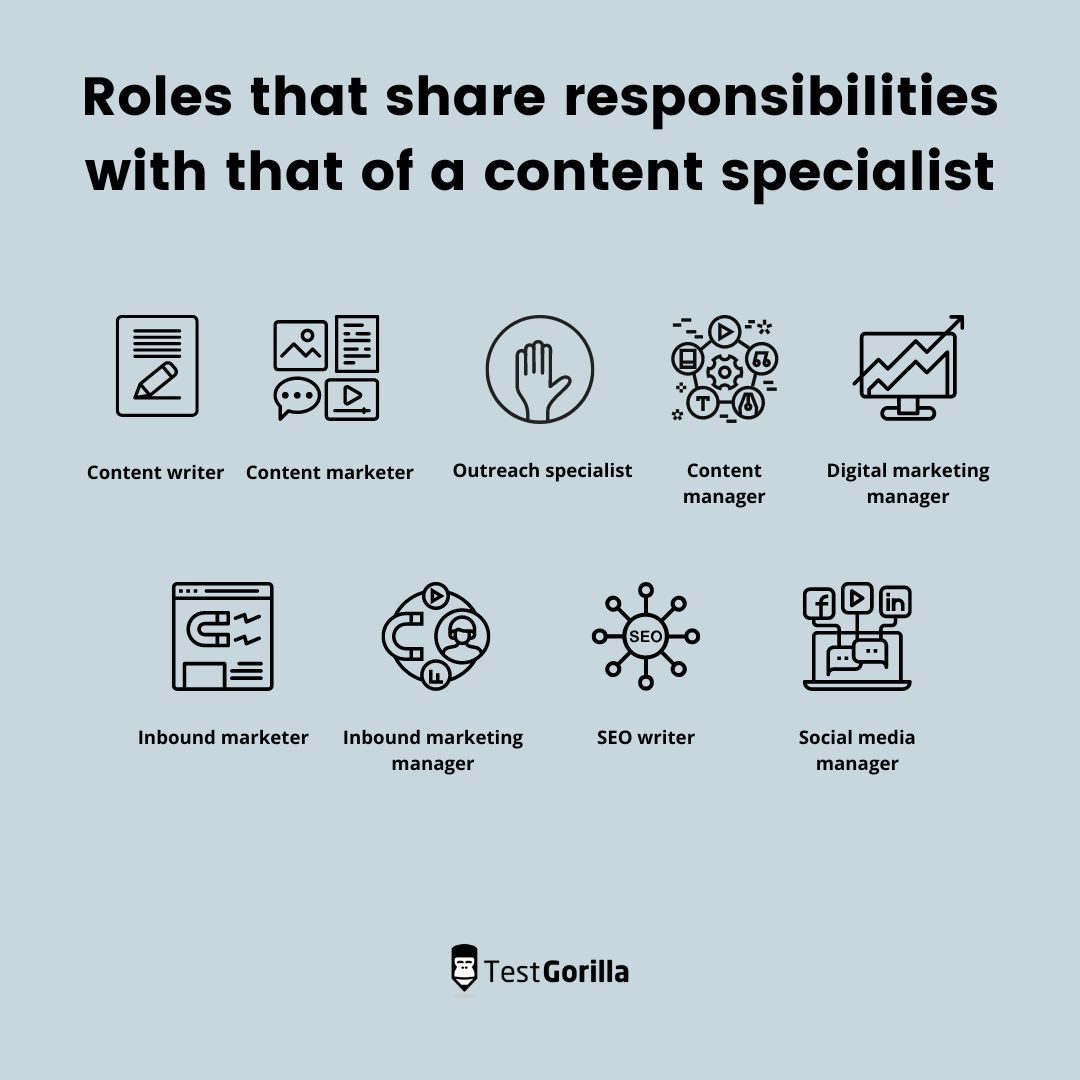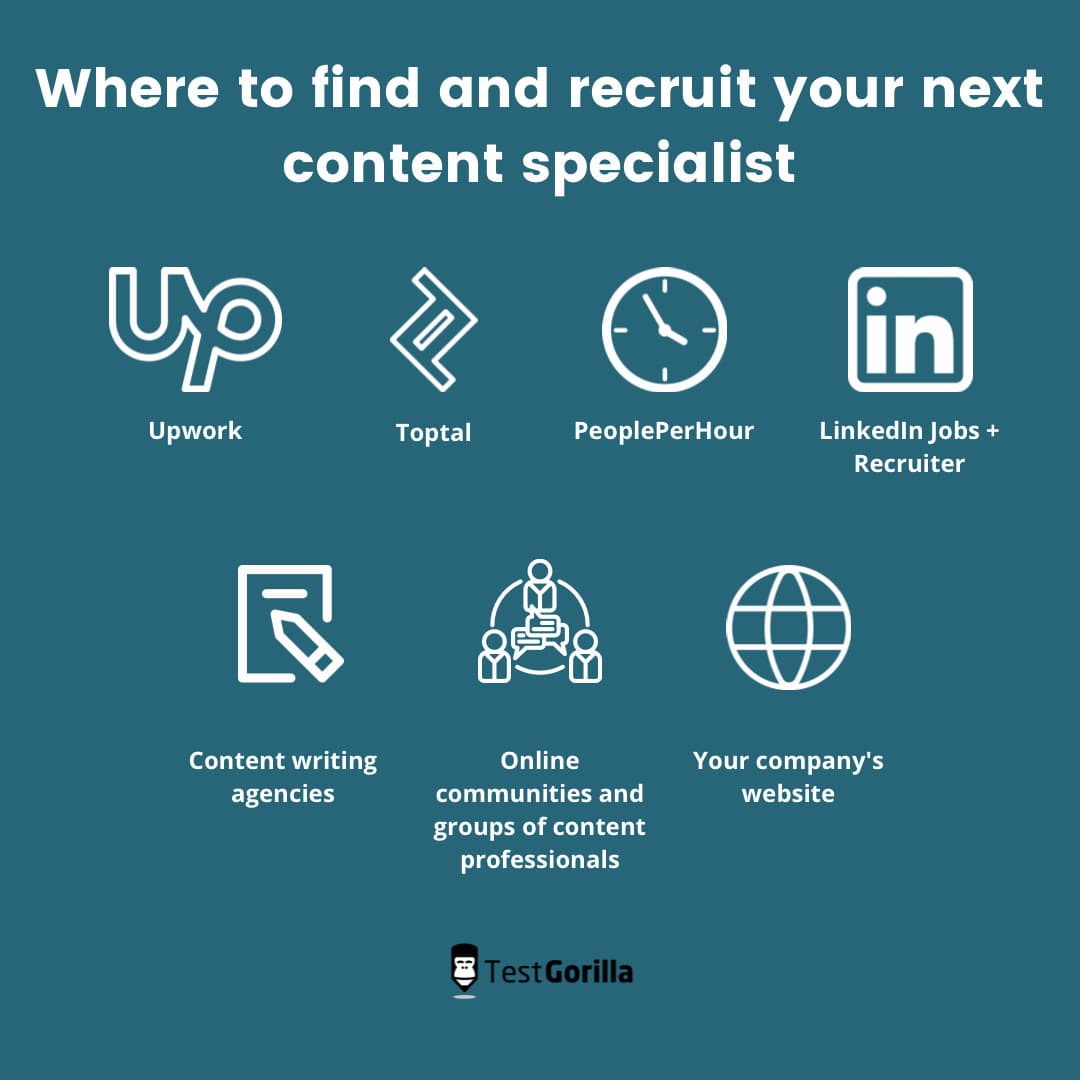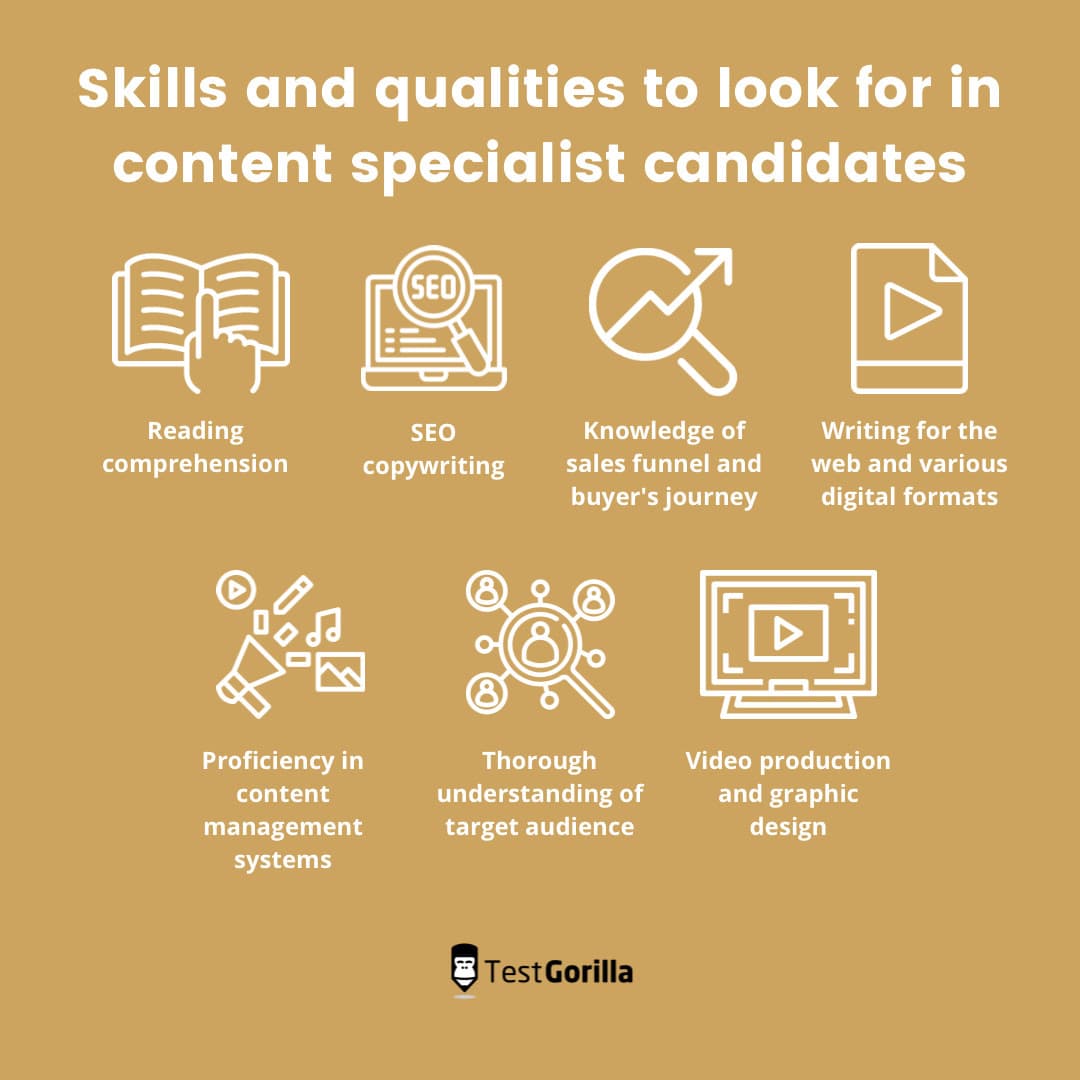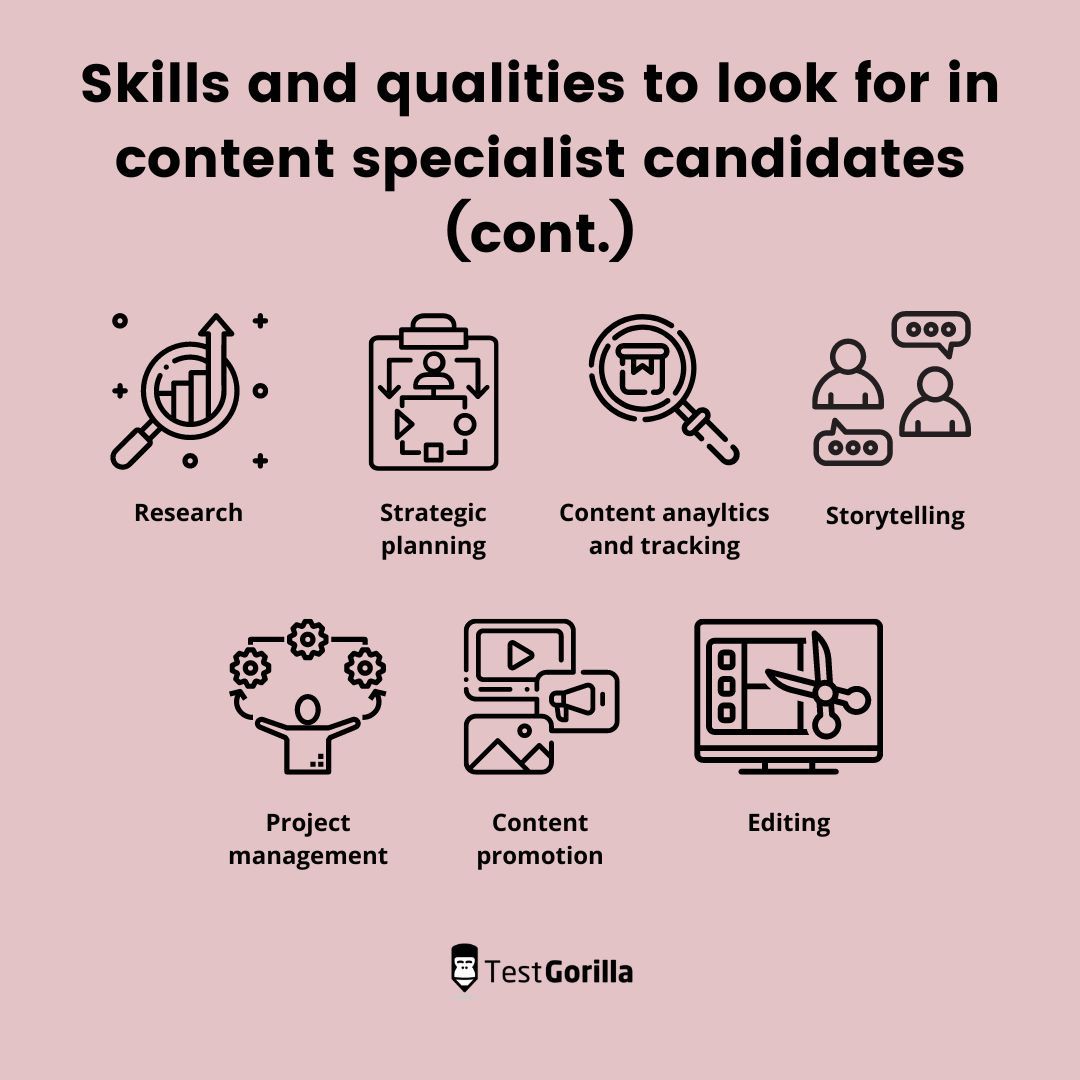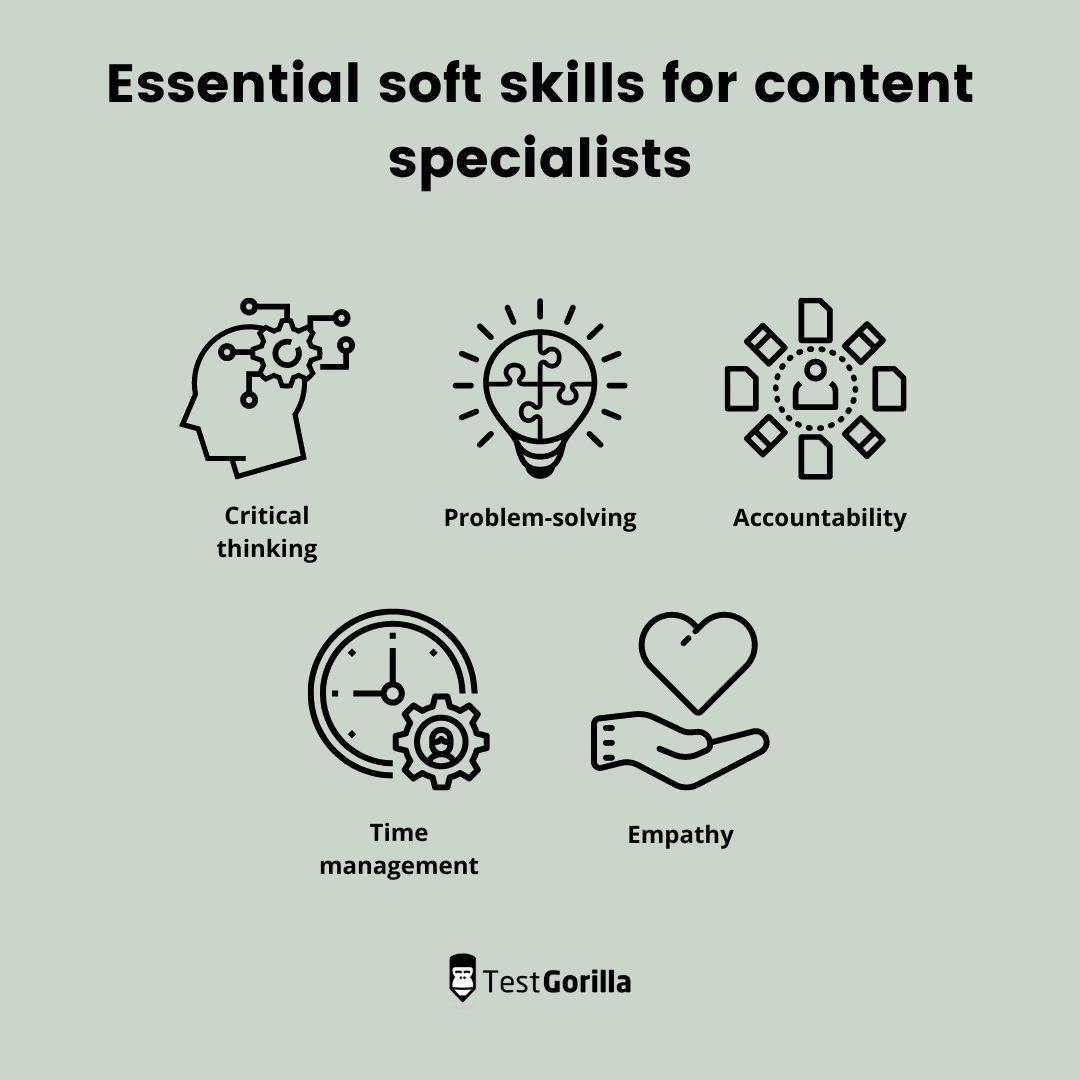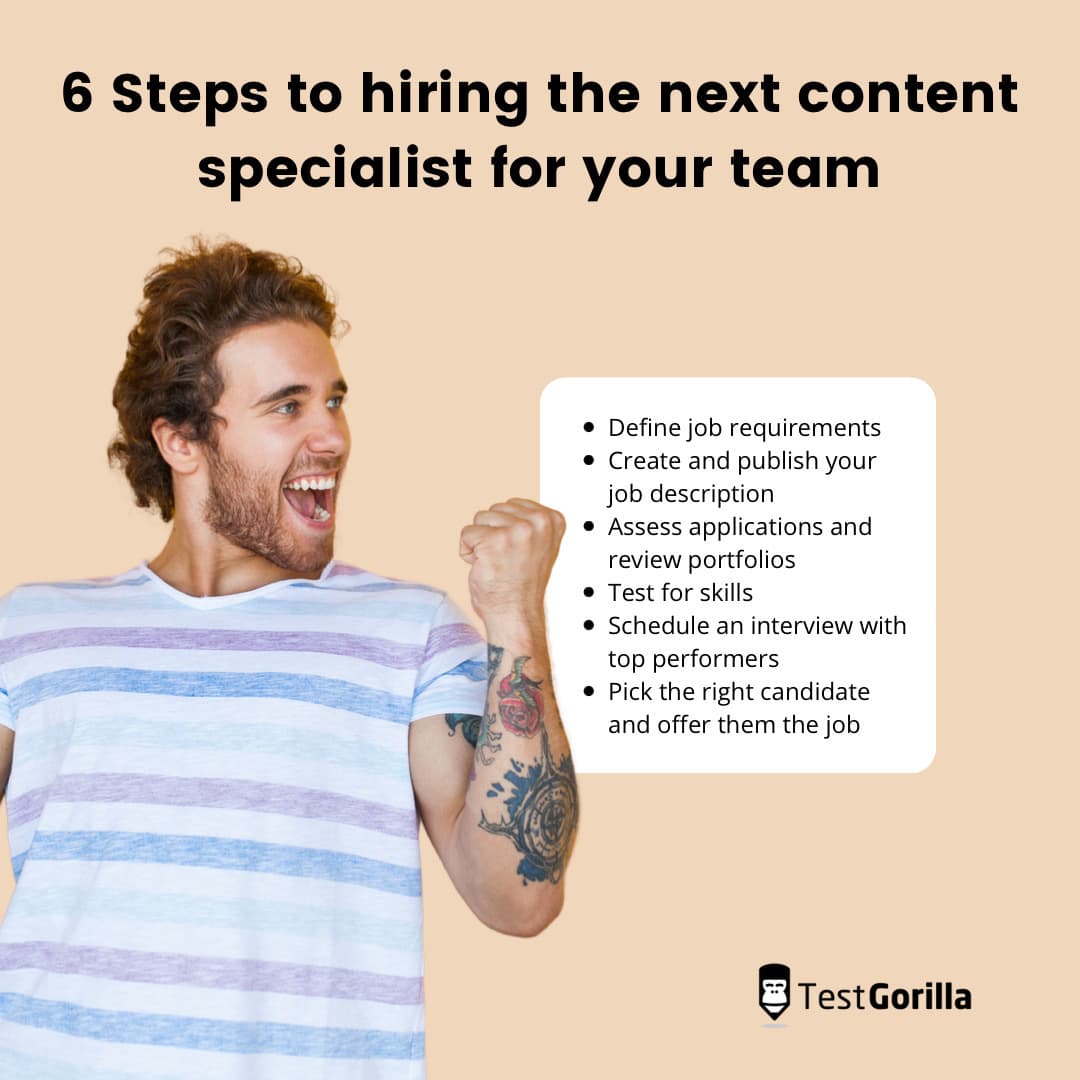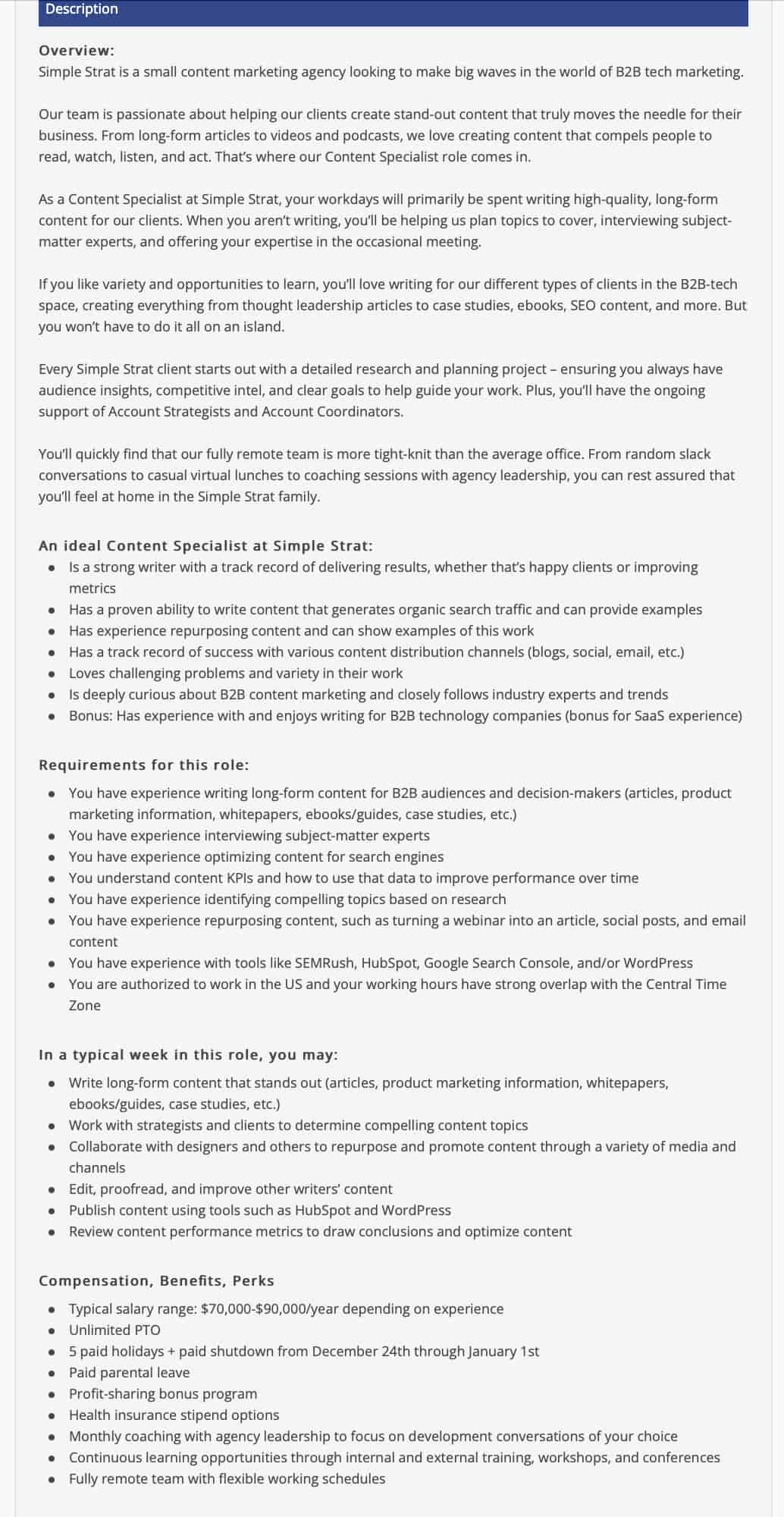How to find and hire the best content specialists for your company
Whether you’re a startup of five or a big brand with thousands of employees dotted around the globe, content creation and implementation can be overwhelming.
Perhaps it’s about time for you to hire a content specialist.
With content marketing playing an essential role in growing a business, it pays to find the right person to do it.
This guide to hiring content specialists will fill you in on the steps to help you hire the right content specialist for your team.
Below, you’ll find everything you need to know about content specialists, from what they do to what skills and qualities to look for when hiring one.
You’ll also find an example of a content job description and the steps to take during the recruiting process.
Let’s take a look.
Table of contents
- What is a content specialist?
- What do content specialists do?
- Why you need a content specialist in your team
- Where to find and recruit your next content specialist
- Skills and qualities to look for in content specialist candidates
- 6 Steps to hiring the next content specialist for your team
- Use skills testing to recruit top content specialists for your team
What is a content specialist?
A content specialist is responsible for uncovering content needs through research, filling in content gaps, developing content strategies, and creating content for digital and/or print media.
Here’s what Ryan Robinson, former content marketing lead at CreativeLive, has to say about what it’s like to be a content specialist for the online classroom brand:
“My primary objectives are to drive targeted traffic, grow our email lists and generate revenue for our online classes. I manage a team of content writers, edit our long-form blog posts and strategically distribute each piece of content after it’s published.”
Content specialists usually work with marketers, designers, and product teams.
What do content specialists do?
The role of a content specialist depends on the industry or organization they work for, the size, and the company’s structure.
For example, a healthcare startup’s content specialist might be the sole person responsible for content creation and distribution, while a healthcare enterprise company may have multiple content specialists under its marketing team.
In general, the responsibilities of a content specialist include:
Perform competitor research and keyword research while taking customer search intent in mind.
Audit existing content and determine content gaps.
Develop a content strategy that balances their research findings and business goals.
Build a content style guide and ensure consistency of brand identity in both print and digital platforms.
Create and manage an editorial calendar (when to publish an article and its frequency).
Manage content workflows.
Create, edit, review, and publish content.
Promote and distribute content.
Track content goals and conversions.
Report content performance.
Work with other members of the team and internal stakeholders.
Work with freelancers, consultants, and contractors.
Ensure content quality, relevance, clarity, consistency, and alignment with brand guidelines.
Keep up with trends and best practices in content production and distribution.
The following roles have responsibilities that overlap with that of a content specialist:
Content writer
Content marketer
Content manager
Content writer
Digital marketing manager
Inbound marketer
Inbound marketing manager
Outreach specialist
SEO writer
Social media manager
The best insights on HR and recruitment, delivered to your inbox.
Biweekly updates. No spam. Unsubscribe any time.
Why you need a content specialist in your team
With content as one of the most powerful pillars of any digital marketing strategy today, businesses will likely fall flat without well-planned, relevant content.
A well-thought-out content marketing strategy, implemented with the help of a content specialist, can significantly improve website traffic, build trust with prospects, and convert them to customers.
From getting more people to buy your new product or promoting loyalty among old customers, a content specialist can help brands of all sizes accomplish their business goals through content.
While some business owners take on the content specialist role themselves, it wouldn’t be the same as having a dedicated one to do it. Content creation and distribution need a lot of attention and careful planning, which may distract you from your business.
Where to find and recruit your next content specialist
Consider the following sites and platforms if you’re on the lookout for content specialists, ranging from online freelancing platforms to exclusive groups of content pros:
1. Upwork
Previously known as Elance-oDesk, Upwork is the most popular online freelancing platform.
With over 12 million registered freelancers, you’re sure to find a good content specialist for your team. Big-named brands trust Upwork, and the process of finding the freelancer you need is straightforward.
You can start by creating your job post, writing the job description, and waiting for freelancers to send in their applications. This platform is free to use, but you can also pay a premium to enjoy more of its features.
2. Toptal
Toptal is another good alternative to finding the best candidates for your team’s content specialist role.
You’ll find many candidates, from beginners to top-tier content professionals. Toptal takes pride that 90% of its clients find the best applicants during the initial screening and that they only feature the top three percent of freelancers on their platform.
During the screening and vetting process, you need to describe your ideal candidate in detail, and the platform will match you with the corresponding freelancers.
Toptal has a money-back guarantee if the content specialist you hire isn’t the right fit for your team.
3. PeoplePerHour
Another contender in the freelancing marketplace is PeoplePerHour.
With over two million profiles to choose from, you will find all types of freelancers and contractors here. PeoplePerHour lets you publish a job post or browse through content specialist profiles.
As its name suggests, you can hire hourly workers, but it’s not restrictive as you can also employ full-time content specialists. Its vetting service is costlier than other job marketplaces.
4. LinkedIn Jobs + Recruiter
As the world’s largest professional network, you can never go wrong with LinkedIn.
You can look up content specialist profiles and use the platform’s search filters to help narrow down candidates and make your search more productive.
LinkedIn also allows you to send InMails to reach candidates outside your network. You can also use the platform to post jobs so that people will come to you instead.
The platform is free, but recruiters and hiring managers can upgrade to a paid version to get more features such as ATS (applicant tracking system) integrations, advanced search filters, saved searches, and the ability to send bulk InMails.
5. Online communities and groups of content professionals
Online communities and groups aren’t just for those looking to expand their professional network and connect with like-minded individuals.
These online watering holes of content professionals are also the perfect spot for recruiters, hiring managers, and business owners looking to hire a content specialist.
For example, you can join Facebook Groups of writers and marketers. Once you share your content specialist job ad in these groups, you’ll likely get high-quality applications or many referrals.
The Superpath community is another excellent example of an online group where you can possibly find your next content specialist. Aside from their job board, they have a thriving community of content marketers and agencies on Slack, with discussions ranging from content strategy to career advice to job listings.
A side benefit of joining these groups is it enables you to understand the ins and outs of the job through community discussions. You’ll also learn about content specialists’ standard rates and salaries in various industries and locations.
7. Content writing agencies
Another way to find content specialists is to contact content production agencies.
These companies offer unlimited content writing services for a fixed monthly rate. You won’t have to search for the right content specialist, as these agencies will be the ones to do it for you.
While many business owners find this a cost-effective way of getting content, it’s not for everyone. This option is for you if you don’t have the time to recruit, vet, or interview candidates.
Content writing agencies are a good choice if you have difficulty managing your existing content production workflows.
8. Your company’s website
Finally, consider sharing your content specialist job listing on your website.
You can create a separate job listing page or write a blog post about the role. Either way, make sure that it’s quick and easy for candidates to apply.
Skills and qualities to look for in content specialist candidates
While you may find hundreds of potential content specialist candidates from the abovementioned platforms, the search does not end there. You have to identify the good ones from the mediocre ones.
To help you with your search, here are the content specialist skills and qualities you should look for and assess:
1. Thorough understanding of the target audience
Your target audience will determine what style, tone, voice, and word choices you need to incorporate into your content.
A good content specialist should deeply understand your audience and know where to look for information about your audience. For example, a content specialist in the cryptocurrency space should know which Discord servers to join to get a feel of the target audience’s motivation, preferences, and language.
2. Knowledge of the sales funnel and the buyer’s journey
Content creation and distribution often aim to persuade prospects to try your product or service. To achieve this, content specialists need to understand the sales funnel and the different types of content appropriate for every stage of the funnel.
3. SEO copywriting
Content is useless if it doesn’t reach your intended audience. Your content specialist should know and be able to implement SEO (search engine optimization) best practices to place your content at the top of search engine pages.
TestGorilla’s SEO Copywriting test gauges a candidate’s skills in understanding search intent, keyword research, implementing on-page and off-page SEO, and optimizing content for search engines.
4. Reading comprehension
Reading comprehension is more than just understanding written texts. It includes the ability to identify the main idea of a paragraph or passage quickly, understand the context, and come up with valid inferences from the text.
TestGorilla’s Reading Comprehension test helps you assess these abilities and skills in content specialist candidates.
5. Writing for the web and various digital formats
A good content specialist should understand that writing for the web isn’t the same as writing a hundred-page novel.
It doesn’t matter if your content specialist has the best ideas, but it’s a waste of effort if the readers don’t understand them.
When creating text content for a website and other digital formats, the goal is to write clearly and to speak your audience’s language. Readers are looking for valuable information, so impressing them with complex words is unnecessary when simple words are sufficient.
It also helps to know and implement the principles of web readability and accessibility, such as using bullets and numbered lists, short paragraphs, and how to format headings.
Finally, writing for digital formats isn’t just limited to creating blog posts. It also includes writing emails, YouTube scripts, and podcast voiceovers.
6. Video production and graphic design
With 89% of marketers in agreement that video gives them a solid ROI (return on investment), your next content specialist should understand the ins and outs of content production workflows. The specialist doesn’t have to be proficient in creating and editing videos. However, they should know and understand the basics.
These skills will be handy if they need to assign video creation and editing assignments to freelancers or team members. The same applies to graphic design workflows.
7. Proficiency in content management systems
One of the primary roles of a content specialist is to edit and publish content on the company’s website. For this reason, a good content specialist should know their way around popular content management systems such as WordPress.
Evaluate your candidate’s skills with the WordPress administration test by TestGorilla.
8. Research
Any seasoned content specialist will tell you that to become one, you need to be a great researcher. Creating content almost always involves thoughtful research.
The content specialist you hire should know where to get reliable sources and how to vet them. They should also know how to back up their content with facts and statistics.
9. Strategic planning
Content specialists must understand that they must spend time strategizing how to deliver their content to the right audience at the right time.
Strategic planning will also come in handy because content specialists need to understand and implement message framing tactics for maximum impact of their content.
TestGorilla’s Content Strategy test is a good start to help assess and evaluate a candidate’s ability to create content that converts.
10. Content analytics and tracking
An experienced content specialist is knowledgeable and proficient in tracking and measuring content performance. They should also be able to report on their content metrics by combining data analysis and qualitative information extracted from tools like Google Analytics.
TestGorilla’s Google Analytics test helps evaluate a candidate’s understanding of Google Analytics data structure and gauge their knowledge of it for efficient and effective website tracking. It can also gauge a candidate’s ability to read and make sense of Google Analytics data.
11. Storytelling
A good content specialist can help drive traffic to your website, but a great content specialist knows how to empathize with your audience, tell a story using your brand voice, and encourage your audience to spend more time on your website.
Look for characteristics of good storytelling in their content portfolio: authenticity, emotional connection, intrigue, memorability, and the ability to “show, don’t tell.”
12. Project management
Content specialists need to be able to manage themselves and others to complete projects and deliverables on time. They should also be familiar with project management tools like Trello and Asana.
The Project management test by TestGorilla evaluates a candidate’s ability to manage their work, estimate deadlines, communicate progress, and make decisions to accomplish business goals.
13. Content promotion
Content creation is just half of what content specialists need to do to achieve business goals. The other half involves content distribution. For this reason, content specialists should know how to promote content through social media, email outreach, and online communities.
To check for this role-specific skill, you can start with TestGorilla’s Social Media Management test and Email Marketing test.
14. Editing
Your next content specialist should have effective editing skills. While you can hire an editor to refine the quality of your written content, like blog posts and scripts, a good content specialist should have an editor’s eye for typos, text redundancy, and grammar errors.
Essential soft skills for content specialists
Now that you already have an idea of role-specific skills to look for in content specialists, it’s equally important to ensure they have the right set of soft skills.
Soft skills are interpersonal attributes of an individual. Also known as people skills, it’s how a person works and relates with others at work.
Here are the important soft skills that an effective content specialist should have:
Problem-solving. A content specialist should understand that creating content for the web is more than just presenting the information. It’s about solving the audience’s pain point or problem through content.
Critical thinking. Critical thinking is crucial in content creation and distribution because it involves identifying the most effective solution to an existing problem. Your content specialist should be able to come up with new solutions or processes to accomplish your business goal. Read our guide on how to assess critical thinking skills in candidates.
Accountability. Accountability is about taking ownership of one’s actions. An effective content specialist should be motivated to get results and understand how their work impacts the accomplishment of business goals.
Time management. The best content specialists are fully aware of their schedules and deadlines. They don’t wait to be asked about their deliverables and the status of their projects.
Empathy. Creating content that resonates well with the target audience begins by putting yourself in the audience’s shoes and understanding their perspectives, experiences, and pain points.
6 Steps to hiring the next content specialist for your team
Now that you know where to search and what to look for in content specialist candidates, your next step is to start the hiring process.
The recruiting process may vary from one company to another, but here’s what it should generally look like:
1. Define job requirements
Before writing your content specialist job description, you should be able to answer the question: “Why are we hiring a content specialist?”
A content specialist’s role is broad, so you should list your specific expectations of the person who will take on the responsibility. Are you going to focus on creating blog content? Or is your team planning to invest more time and resources in making TikTok content?
Are you looking for someone who will take on a more strategic role? Or are you expecting someone who is more of an individual contributor?
Finally, at this point, you should also know how much you’re willing to offer your chosen candidate, including benefits and work arrangements (freelance, full-time, contractual, etc.).
2. Create and publish your job description
After identifying the specific job requirements for the role, you’re ready to create and publish your job description for your next content specialist.
Here’s an example of a job description that Simple Strat used when they were looking for a content specialist to join their team:
Once you’ve built your content specialist job description, it’s time to publish and launch it!
Don’t forget to include the following details in your job description:
How to apply
Salary range/rates
A brief explanation of what the recruiting process is like
Recommended resource: Explore our job description template for content strategists.
3. Assess applications and review portfolios
One of the most crucial factors to consider when hiring a digital content specialist is their skill level. A single writing sample may not be enough, so a candidate’s portfolio is an excellent start to gauge their capabilities.
Aside from reviewing portfolios, check about their previous work experiences. Look for someone who’s in the same industry or niche as yours. A content specialist who mainly wrote about power drills may not sit well when you ask them to write about fashion and beauty.
4. Test for skills
Once you’ve shortlisted your candidates after reviewing their portfolios, your next step is to gauge the candidates’ skills.
Skills testing for content specialists may include the following:
Trial work
Not only will this prove what’s in their portfolio, but you can also assess their suitability for the job. You can ask them to write a full script, do some editing, or create an outline of a blog post.
Quick reminder: Don’t fall into the trap of assigning a sample exercise for free. Make sure the candidate gets paid for it and be considerate enough to give trial work that takes them a few hours, not days.
Skills testing
Start the skills testing process by using a pre-employment skills assessment tool like TestGorilla.
Using skills tests can help you hire the most suitable content specialists for your team and avoid costly mis-hires. Often, work samples and portfolios may not give you enough information about a candidate.
It also helps that skills testing can reduce bias during the hiring process, as the questions are designed for job-relevant suitability and are crafted by industry experts.
Here are three easy steps to using TestGorilla’s skills tests for content specialist roles:
Start the process by creating a TestGorilla assessment.You can add up to five tests in total to build an assessment in TestGorilla. You can combine role-specific skills tests and soft skills tests. You can also opt to ask the candidate to take individual tests rather than make an assessment. You can read the step-by-step guide to creating an assessment in TestGorilla.
Customize your assessment. For example, you can add custom questions or ask for a recorded video response.
Share your assessment with candidates. TestGorilla allows you to share a public URL with candidates or send them invitations via your applicant tracking system.
Afterward, you’ll receive the results of each assessment. TestGorilla automatically ranks candidates based on their results too. It saves you precious time and ensures a more objective selection of candidates.
5. Schedule an interview with top performers
Schedule an interview with candidates who passed your portfolio review and skills testing.
An interview can give you a glimpse of the candidate’s enthusiasm, time management skills, and soft skills. You can learn more about their creativity, curiosity, and research abilities when you speak to them face-to-face (whether in the office or online).
Examples of questions to ask when interviewing content specialist candidates
If you’re unsure of what interview questions to ask, or if you already have a list of your own, use these examples as a guide:
What makes good content?
A great content specialist should know what makes effective content. This will show you if they understand the importance of aligning their work with your marketing strategies.
Good answers will be along these lines: “Good content informs, engages, and builds trust with the audience” or “It drives traffic, boosts page views, and attracts qualified leads.”
What information do you need before creating content?
A good content specialist identifies their target audience, what their audience wants to know, the best platforms to reach their audience, and the overall business goals.
What SEO practices do you use?
Content creation shouldn’t be a content specialist’s only skill. They must know good SEO practices to get your brand on top of search engines. Keyword research, on-page SEO, basic technical SEO, and link-building strategies are equally important.
What do you enjoy reading?
Good content specialists are voracious readers. Reading hones writing skills, helps improve cognitive skills, and widens one’s way of thinking. They should also consume content from content and inbound marketing industry leaders like HubSpot and Ahrefs.
Describe your content creation workflow.
The right candidate should be able to accurately describe in detail the steps in their workflows and give you a corresponding rationale for each step.
How do you differentiate a credible source from a non-credible one?
This question will give an insight into a candidate’s critical thinking and judgment skills. Ensure the candidate understands the importance of citing reliable, trustworthy sources. They should know that low-authority websites aren’t good sources of information.
6. Pick the right candidate and offer them the job
After interviewing the top performers of skills testing and trial work, you’re ready to pick the right candidate.
Make an offer based on the candidate’s value to your team. It also helps to offer a competitive salary and benefits because it can help you retain top employees. You can send the offer in writing or inform them via video or voice call.
Finally, it’s good practice to communicate and provide feedback to candidates that didn’t make it. It helps improve the candidate experience and can help boost employer branding.
Use skills testing to recruit top content specialists for your team
Reviewing content specialist portfolios and inviting them to an interview may not be enough to help you pick the best candidates for a content specialist role.
You need to assess for role-specific skills and soft skills first before conducting interviews. This way, you’ll get objective, bias-free results to help you make the right hiring decision.
With TestGorilla, developing an objective content specialist assessment is possible with just a few clicks. Skills tests like the SEO Copywriting test, WordPress Administration test, and soft skills testing like the Critical Thinking test are created and designed by experts in the field.
TestGorilla has a comprehensive library of skills tests too. You don’t have to go to one platform to gauge technical skills and sign up for another to assess soft skills and culture add.
Try it for free today and find your next content specialist through a faster, more objective hiring process.
You've scrolled this far
Why not try TestGorilla for free, and see what happens when you put skills first.


